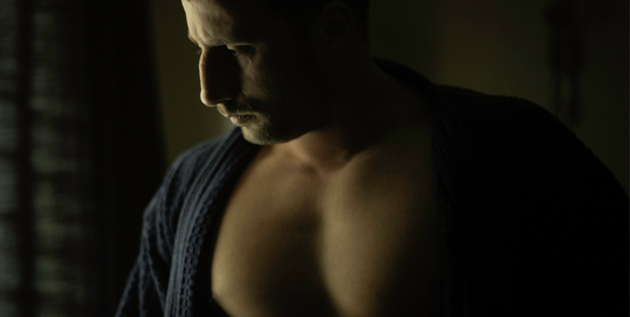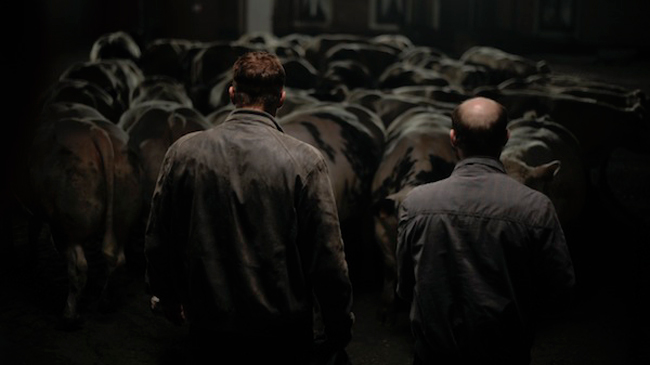
Setting up my schedule for the Vancouver International Film Festival by rummaging through its website finding award-winners and acclaimed features worth checking out, it was still a bit of a happy accident I found myself in the Empire Granville 7 for a screening of Bullhead. Unaware of the press protocol for getting tickets due to it being my first day in the city, I found myself at the pass table about two hours too late from being in the tenacious daily morning queue. Miraculously, however, just a mere thirty minutes before the lights would dim, a ticket remained.
Director Michaël R. Roskam stood to give a brief introduction and the festival programmer in charge shared how Bullhead had just beat out the Dardennes for Belgium’s Oscar entry. My anticipation skyrocketed and my luck to be there became even more insane after learning the previous evening’s screening had malfunctioned. The stars truly aligned as though I was destined to experience the gritty, powerful, and brilliant work of art that rare sunny October day in Vancouver.
Suffice it to say, the film was not only my favorite of the festival but also a surefire resident in my annual top ten list. It’s a work that begs to be seen by cinephiles as its showcase actor Matthias Schoenaerts takes us on a journey through the harsh terrain of his broken psyche and the rough environment of bovine steroid trading he’s attempted to survive within.
Fresh off its Oscar nomination—an underdog yet again with heavyweights like A Separation alongside it—and a forthcoming American release courtesy of Drafthouse Films, I had the chance to talk with the director and star about their preparation and dedication to this phenomenon. Cut short due to a tight schedule on their end, I wasn’t able to ask about the Mondo poster for their inevitable Alamo release, but the insight shared about their process is still well worth a read.

The Film Stage: I wanted to congratulate you on the Oscar nomination. I’m sure it’s kind of been a roller coaster ride since beating out the Dardennes [Jean-Pierre and Luc Dardenne] and getting this far now. Could you talk about that process in Belgium? Did you have to campaign like studios here in America do?
Michaël R. Roskam: Well, we didn’t really …
The thing is—the movie was released in the beginning of February and we had a lot of good previews. The critics loved us, the press loved the movie, and the audience did—so we were a box office success as well. Almost five hundred thousand of a six million territory, so almost ten percent of the people saw the film in my country.
The movie campaigned for itself, so we weren’t doing any of that. And actually, we were really hoping, but I expected, honestly, that the Dardennes Brothers with A Kid with a Bike was going to be the entry because if you look at their festival list and awards they were winning and also their status—I mean they’re the big guys. They’re huge in our country.
So I was like, “Okay, cool. It’s not so bad if the Dardennes Brothers go.” Getting beaten by the Dardennes Brothers isn’t a disaster, I mean—it’s okay. But then we were the Belgian entry, so then it was suddenly kind of exciting and also a little pressure was there. I felt like, what if we’re not getting even short-listed? People would probably say, you know, “See? We should have sent the brothers [the Dardennes].”
So there was a little bit of that, but then at the same time I was really just honored and very excited that we were the entry. And it’s kind of a first [step] to put us on the map a little because we were the guys who beat the Dardennes Brothers. So people were starting to get curious: “What’s this movie? Who’s this guy?” They discovered the movie and it started to have this beautiful career starting here in the US, starting at Fantastic Fest where we won—we had the US Premiere—we won three awards. And Tim League from Drafthouse jumped on the movie because Tim League was the director of the film festival. [Now] he’s our distributor with Drafthouse Cinema; he purchased the movie and he’s been on the team now helping us big time with the campaign and promoting the movie of course.
And it’s going well. I think this is one of the reasons maybe that—yeah, sure, [laughter] this is why we got nominated. It’s about the team behind it. We all play on the same level, we all are connected, and it works good.
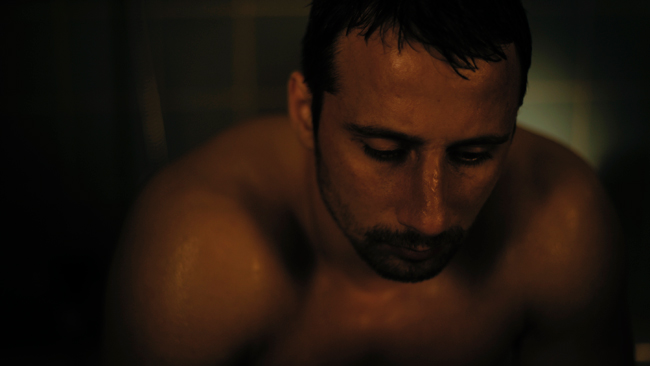
Now, this film is very much in that mafia/gangster world, but that’s almost more of a backdrop to a very intimate story with a sympathetic antihero. It’s loosely based on that 1990s veterinarian murder—was that the impetus to the story or did you have the character-based idea first that you then put into that environment?
Roskam: Well, I think the facts of the shooting itself were always in my mind. The fact that there was a veterinarian inspector of the Food and Drug Administration killed—assassinated in the 90s—is of course something that you cannot forget. It was a huge political scandal—a huge scandal in my country with a lot of political consequences. So that was there and, of course, I mean you can’t invent this thing.
I had plans of making film noir and gangster movies—that’s the kind of movies I want to do. […] Having this [the bovine steroid trade] is so unique and with it in the back of my head I started to look for a tragedy that was strong in the themes that I’m interested in and putting it all in a story. I wanted the whole thing—a tragedy about destiny and impotence and the loss of innocence. All those things were already there in my mind, so …
And then it all just came in my mind. I mean it’s my imagination. I think dancing around the facts is what started to create the story.
And for Matthias, what necessarily brought you to the project? I know you worked with Michaël before on a short film, but to spend years of your life preparing and putting on the sixty pounds of muscle—what really drew you to the project?
Matthias Schoenaerts: Well, right from the start when Michaël told me his idea for this film, somehow it just—it was an enormous gut feeling. Sometimes you can’t really explain why you’re so drawn to something. It was just an instinctive, intuitive gut feeling that really got me crazy—that’s it.
And this was seven years ago and straight away I was ready to go all the way for this film. Then I read the first draft of the script and I realized, “Okay, I’ve got to create a kind of a Frankenstein-type of being.” I had this image that stuck with me in my brain and it was this minotaur—this half bull half man—and I was, “Okay, I’ve got to start working cause I’m a really skinny-ass little boy.”
[laughter]
And so I had to go way back—even six years ago I already started working out to have a little basis to work from once I knew when we would shoot the film.
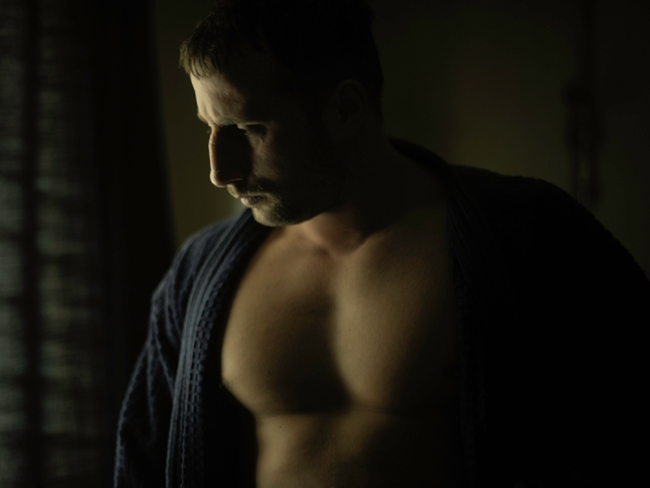
Were you Method on set? You’re this hulking beast on screen but there is such a vulnerability to the character with the flashbacks and where he’s coming from. Were you just ready to go when Michaël said action or was there a lot of preparation on a daily basis?
Schoenaerts: Of course, I’ve been developing and thinking about the character—I had the chance to think about the character for more than six years and that allowed me to really get into the character on the deepest level.
And of course I considered everything, especially the vulnerable part. That, to me, was more important than this animalistic presence that he had. There was that physicality that was needed for the part, but to me, my way to get into the character was through this vulnerability because that to me was the core of the character and not his brutality or whatsoever.
For Michaël: a question about preparation for the film. Was there a lot of storyboarding? With that opening shot of the camera pan against the wall and then pushing forward into our introduction to this world—everything looked meticulously detailed. Was everything prepared; was their collaboration with actors on set about what to do?
Roskam: It was all—I think the whole crew was very, very well prepared. I mean we shot this film with a low budget. It’s still a lot of money, but we were pretty ambitious and we had thirty-five days so we had to be well prepared. We wanted to bring some high production value.
I developed this film with a lot of people. The composer [Raf Keunen] was already a part of it from the beginning—discussing the film and the music—and of course the director of photography, Nicolas Karakatsanis, was also involved in the process very early. I did all the storyboarding myself and always checked with him.
I mean it’s all about—first it’s about the light, the contrasts, lights and darks, and shadows and stuff. That’s one. The second thing is the positioning of the framing and the third thing is the movement of the camera and for those things we had basic concepts. We always used these for every start, for every scene we were going to shoot, and that helped us a lot to be very disciplined and at the same time—thanks to this concept—we were really proud. That’s the one that helped us to create this movie in a very artistic way and still very accessible.
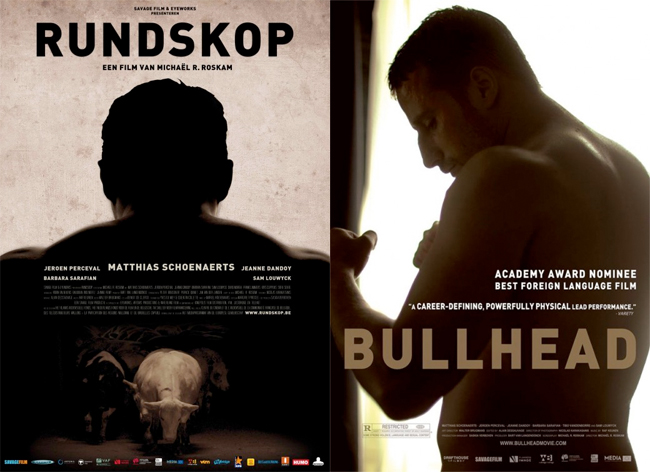
Bullhead opens in NYC/LA/Austin on February 17th.

